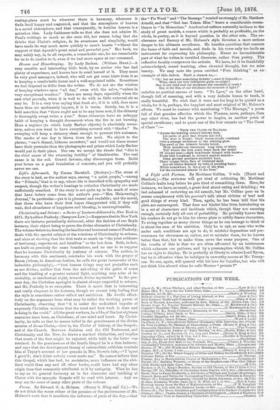Christianity and Science: a Series of Lectures delivered in New
York in 1874. ByA.ndrew Peabody. (Sampson Low.)—It appears that in New York there are lectures periodically delivered, after the fashion of our Boyle lectures, their object being to prove the divine character of Christianity. The volume before us, bearing the familiar and honoured name of Peabody, deals with the special subject of the relations of Christianity to science, and aims at showing that the first rests as much on "the joint evidence of testimony, experiment, and intuition" as the last does. Both, in fact, are built on precisely the same foundations, and no one is to suppose that he honours Christianity by jealousy of science. The author, in harmony with this sentiment, concludes his work with the prayer of Bacon (whom, in American fashion, he calls the great instaurator of the inductive philosophy),—" that human things may not prejudice such as are divine ; neither that from the unlocking of the gates of sense and the kindling of a greater natural light, anything may arise of in- credulity, or intellectual night, towards divine mysteries." In the pre- sent day, the Christian apologist is almost always respectful to science, and Dlr. Peabody is no exception. There is much that is interesting and really eloquent in his lectures, though we cannot help feeling that
the style is sometimes rather stilted and ambitious. He dwells effect- ively on the argument from what may be called the working power of Christianity, observing that "it is under the undoubted impulse of
expressly Christian motives that the most and best work is done and is doing in the world." All the great workers, he adds; of the last eighteen
centuries have been, as Christians, of one mind and heart. By Christ- ianity, he tells us that he means belief in the genuineness of the divine mission of Jesus Christ,—that is, the Christ of history, of the Gospels, and of the Church. Between Judaism and the Old Testament, and Christianity and the New, ho draws a marked distinction, and implies that much of the first might be rejected, while faith in the latter was retained. In the genuineness of the fourth Gospel he is a firm believer, and says that the development theory of rationalistic criticism reminds him of Topsy's account of her genesis in Mrs. Stowe's tale,—" I 'spect
I grow'd ; don't think nobody never made me." He cannot believe that
this Gospel, which has had, he maintains, more influence on the civi- lised world than any and all other books, could have had any other
origin than that commonly attributed to it by antiquity. What he has to say on its general harmony as to the character and teaching of Christ with the synoptic Gospels will be road with interest. And we may say the same of many other parts of the volume.






























 Previous page
Previous page